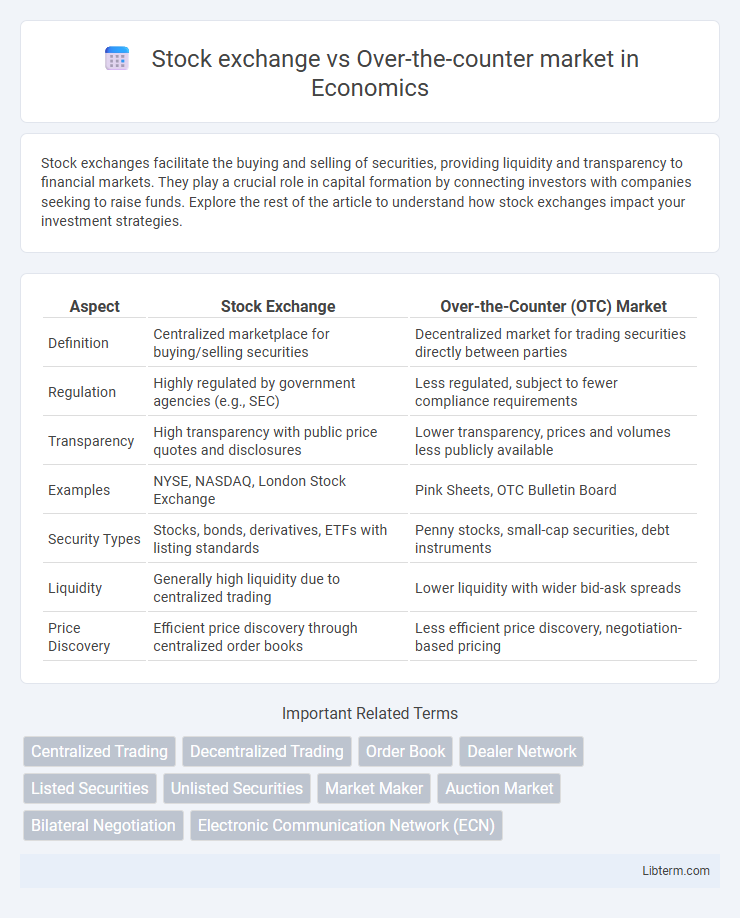Stock exchanges facilitate the buying and selling of securities, providing liquidity and transparency to financial markets. They play a crucial role in capital formation by connecting investors with companies seeking to raise funds. Explore the rest of the article to understand how stock exchanges impact your investment strategies.
Table of Comparison
| Aspect | Stock Exchange | Over-the-Counter (OTC) Market |
|---|---|---|
| Definition | Centralized marketplace for buying/selling securities | Decentralized market for trading securities directly between parties |
| Regulation | Highly regulated by government agencies (e.g., SEC) | Less regulated, subject to fewer compliance requirements |
| Transparency | High transparency with public price quotes and disclosures | Lower transparency, prices and volumes less publicly available |
| Examples | NYSE, NASDAQ, London Stock Exchange | Pink Sheets, OTC Bulletin Board |
| Security Types | Stocks, bonds, derivatives, ETFs with listing standards | Penny stocks, small-cap securities, debt instruments |
| Liquidity | Generally high liquidity due to centralized trading | Lower liquidity with wider bid-ask spreads |
| Price Discovery | Efficient price discovery through centralized order books | Less efficient price discovery, negotiation-based pricing |
Introduction to Stock Exchange and Over-the-Counter Market
A stock exchange is a centralized platform where securities such as stocks and bonds are bought and sold under regulated rules, providing transparency and liquidity to investors. In contrast, the over-the-counter (OTC) market involves decentralized trading directly between parties, often for securities not listed on formal exchanges, resulting in less transparency but greater flexibility. Both markets play crucial roles in capital formation, with stock exchanges offering standardized trading environments and OTC markets catering to niche or less liquid instruments.
Definition of Stock Exchange
A stock exchange is a centralized marketplace where securities such as stocks and bonds are bought and sold, regulated by official authorities to ensure transparency and investor protection. Unlike the over-the-counter (OTC) market, trading on a stock exchange occurs through a formalized system with listed companies meeting strict requirements. Prominent examples include the New York Stock Exchange (NYSE) and the Nasdaq, which facilitate high liquidity and standardized transactions.
Definition of Over-the-Counter (OTC) Market
The Over-the-Counter (OTC) market is a decentralized trading platform where securities, commodities, or derivatives are traded directly between parties without a centralized exchange. OTC transactions are conducted through dealer networks, offering greater flexibility in terms and conditions, often involving stocks not listed on formal exchanges like the NYSE or NASDAQ. This market is vital for trading less liquid or smaller capitalization assets, providing access to securities that may not meet exchange listing requirements.
Key Differences Between Stock Exchange and OTC Market
Stock exchanges are centralized platforms where securities are listed, regulated, and traded with transparent pricing, while over-the-counter (OTC) markets are decentralized networks where securities are traded directly between parties without a formal exchange. Stock exchanges generally involve higher liquidity, standardized contracts, and stringent regulatory oversight, whereas OTC markets offer less liquidity, customized contracts, and looser regulation. Key differences also include the types of securities traded; stock exchanges typically list equities of established companies, whereas OTC markets accommodate smaller, less liquid stocks, bonds, and derivatives.
Trading Mechanisms: Stock Exchange vs OTC
Stock exchanges operate through centralized, regulated platforms where securities are traded with standardized rules, ensuring transparency and liquidity. Over-the-counter (OTC) markets involve decentralized trading directly between parties via dealer networks, often accommodating less liquid and more diverse securities. This decentralized mechanism in OTC markets results in greater flexibility but typically less transparency compared to the formal stock exchange systems.
Regulatory Environment
Stock exchanges operate under stringent regulatory frameworks established by government agencies such as the Securities and Exchange Commission (SEC) to ensure transparency, investor protection, and market integrity. In contrast, over-the-counter (OTC) markets are less regulated, with trading conducted directly between parties, often resulting in higher risks due to limited oversight and disclosure requirements. Regulatory environments in stock exchanges enforce strict reporting standards and compliance protocols, while OTC markets rely on bilateral agreements and are subject to varying degrees of regulation depending on jurisdiction.
Transparency and Price Discovery
Stock exchanges provide high transparency through centralized trading platforms where prices are publicly quoted and transactions are recorded in real-time, facilitating efficient price discovery. Over-the-counter (OTC) markets operate through decentralized networks of dealers, leading to less transparent pricing and limited public visibility of transaction details. This reduced transparency in OTC markets can result in wider bid-ask spreads and less efficient price discovery compared to regulated stock exchanges.
Types of Securities Traded
Stock exchanges primarily list equities such as common and preferred stocks, as well as exchange-traded funds (ETFs) and bonds, ensuring transparency and regulatory oversight. Over-the-counter (OTC) markets facilitate trading in a broader range of securities including penny stocks, derivatives, debt instruments, and foreign exchange products that may not meet listing requirements. The OTC market offers greater flexibility but tends to involve higher risk due to less stringent reporting standards and lower liquidity compared to stock exchanges.
Advantages and Disadvantages
Stock exchanges provide high liquidity, transparent pricing, and regulatory oversight, enhancing investor confidence and facilitating large-scale trading with standardized contracts. Over-the-counter (OTC) markets offer flexibility, access to a broader range of securities including those not listed on formal exchanges, and potentially lower costs, but they suffer from lower transparency, higher counterparty risk, and less liquidity. Investors must weigh the structured environment and stringent regulations of stock exchanges against the customizable, yet riskier, nature of OTC transactions.
Conclusion: Which is Right for Investors?
Stock exchanges offer high transparency, regulated environments, and liquidity, making them suitable for investors seeking security and price stability. Over-the-counter (OTC) markets provide access to a broader range of securities, including smaller or less liquid stocks, appealing to investors willing to assume higher risk for potential gains. Choosing between them depends on investment goals, risk tolerance, and preference for regulatory oversight versus market flexibility.
Stock exchange Infographic

 libterm.com
libterm.com